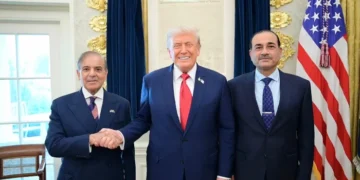President Donald Trump is set to host Pakistan’s Chief of Army Staff, Field Marshal Asim Munir, for a high-level lunch meeting today during the army chief’s official visit to the United States. According to security sources, the meeting is scheduled for 10 PM Pakistan Standard Time (PST) in the White House Cabinet Room, as outlined in the president’s official schedule.
This engagement marks a key moment in COAS Munir’s U.S. visit, which also included a meeting with the Pakistani diaspora in Washington, D.C., where he praised their significant contributions to the nation’s economy and global image through remittances, investments, and professional achievements, according to a statement by ISPR.
Strengthening Diplomatic Engagement
Former foreign minister and Pakistan Peoples Party (PPP) Chairman Bilawal Bhutto Zardari hailed the meeting as a “positive development in Pakistan-U.S. relations.” He emphasized the importance of President Trump’s involvement in mediating a ceasefire between Pakistan and India following last month’s armed escalation.
“Following Pakistan’s clear victory in the recent five-day conflict, India has unfortunately resisted all moves toward lasting peace, despite U.S. diplomatic efforts,” Bilawal noted. He stressed that while Pakistan is not eager for confrontation, it understands the value of dialogue and mutual peace.
He further criticized India’s approach in the region, pointing out issues such as water politicization, Kashmir repression, and the manipulation of terrorism narratives. “The solution lies in transparent diplomacy, not denial,” he added.
Ceasefire After Intense Clashes
Field Marshal Munir’s visit follows the Trump administration’s mediation in a ceasefire that ended a violent 87-hour conflict between Pakistan and India. The clashes erupted after the Pahalgam attack in Indian Illegally Occupied Jammu and Kashmir, which India blamed on Pakistan without providing evidence.
The brief but intense conflict resulted in the deaths of 40 civilians and 13 military personnel in Pakistan. Islamabad responded by launching Operation Bunyan-um-Marsoos, in which six Indian Air Force jets, including three Rafales, were reportedly shot down.
A ceasefire was eventually reached on May 10 with U.S. facilitation, effectively halting further escalation between the two nuclear-armed neighbors.
Global Outreach and Regional Dynamics
In the wake of the ceasefire, both countries launched global diplomatic campaigns to garner support for their respective narratives. Pakistan’s effort is being led by Bilawal Bhutto, who is heading a nine-member parliamentary delegation visiting multiple countries to present Pakistan’s perspective and challenge India’s account of the conflict.
The visit also occurs against the backdrop of heightened tensions in the Middle East, particularly due to the ongoing conflict between Israel and Iran, sparked by an Israeli strike on Tehran and subsequent Iranian retaliation.
Counter-Terrorism Collaboration
In addition to Kashmir, counter-terrorism remains a central area of collaboration between Islamabad and Washington. U.S. Central Command (Centcom) Chief General Michael Kurilla recently described Pakistan as a “phenomenal partner” in the fight against global terrorism. He highlighted the country’s success in combatting Daesh-Khorasan and its crucial role in the broader counter-terror effort.
President Trump also acknowledged Pakistan’s assistance in apprehending a Daesh operative linked to the deadly 2021 Abbey Gate bombing in Kabul, which killed 13 U.S. service members and nearly 170 Afghan civilians during the U.S. withdrawal from Afghanistan.













